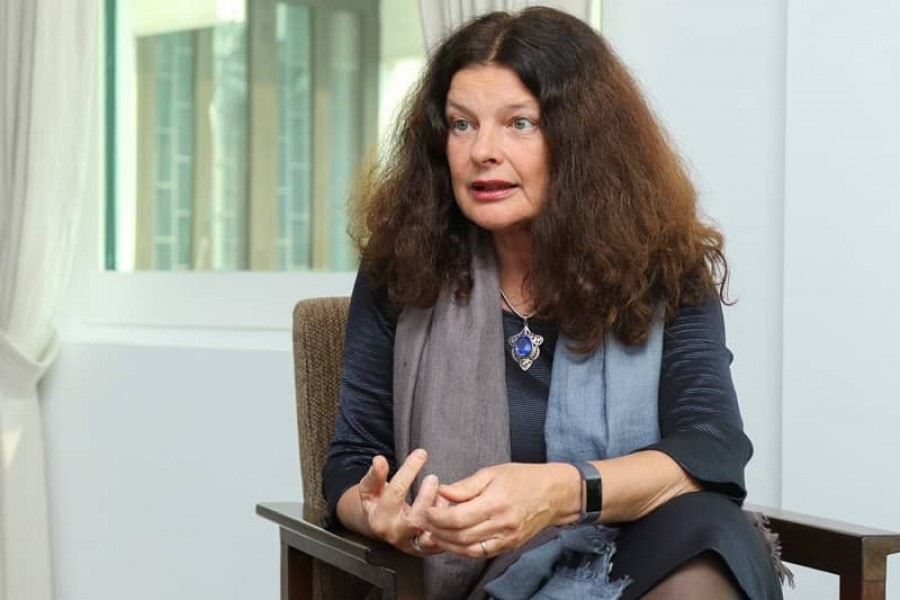
Published :
Updated :

European Union (EU) Ambassador to Bangladesh Rensje Teerink has suggested that Bangladesh should address outstanding labour issues including freedom of association in the Export Processing Zones (EPZs) for availing GSP-plus benefits.
"EU grants Everything But Arms (EBA) privilege to Bangladesh. We acknowledge that Bangladesh is one of least developed countries (LDCs) which benefits greatly from the EBA scheme," she told the 6th EU-Bangladesh Business Climate Dialogue held at the Ministry of Commerce in Dhaka on Sunday.
Bangladesh is already enjoying EBA facility from European Union member countries. EU is working with the government of Bangladesh to handle GSP-plus issues, she added.
Ms Teerink said Bangladesh has to make sure many of outstanding labour rights issues and also address them. "And we are working with the ministries concerned and work is progressing in this regard."
The EU envoy also mentioned that Bangladesh has made a lot of progress in labour rights issues.
"Dynamism of the EU-Bangladesh Business climate Dialogue shows that both sides, we really want to ensure ease of doing business in these countries."
She added: "We are supportive to the goals of Bangladesh graduating from LDC status by 2024 and it is very ambitious development agenda. Foreign Direct Investment (FDI) plays a key role here."
The EU envoy further mentioned, "Together, we are joining hands to address impediments to more FDI from EU countries to Bangladesh."
She said, "We have covered a lot of grounds in the dialogue and some outstanding issues have finally been resolved. But we have still lot of works with NBR, BIDA, commerce ministry and private sectors."
Ms Teerink hoped to see impressive progress in the next dialogue to be held in July, 2020.
Commerce Minister Tipu Munshi inaugurated the dialogue and led the Bangladesh side at the discussion, attended by ambassadors of eight EU countries. Rensje Teerink led the EU side.
Commerce Secretary Md. Jafar Uddin, Bangladesh Tariff Commission Chairman Tapan Kanti Ghosh, representatives from different sectors, National Board of Revenue (NBR), Bangladesh Investment Development Authority (BIDA), and senior officials of the commerce ministry were also present.
The commerce minister in his inaugural speech said, "We take stock of progress, review the activities taken so far, and decide on the next course of action so that the business moves smoothly and the investors have trust and confidence in our economic environment."
EU grants duty-free and quota-free market access for all LDCs including Bangladesh under its Everything But Arms (EBA) scheme which has created a platform to boost our export, he said.
He added: "We deeply acknowledge that this has significant contribution to turn Bangladesh into the second largest exporter of readymade garment (RMG) in the world. With the liberal trade regime of the EU, about 58 per cent of our exports are destined to EU countries that generate about US$22 billion foreign exchange in fiscal year 2018-19. Our consistent export growth enabled us to achieve the threshold requirement for the graduation from the LDC status."
Mr Munshi who presided over the dialogue focused on some of the challenges that Bangladesh might face in the upcoming days. "In the post-graduation era, the EBA facilities may be withdrawn from 2027," he added.
The minister urged the EU to provide GSP Plus trade facilities for Bangladesh for the continuation of import growth and achieving SDG goals by increasing the existing threshold of 6.5 per cent of total export of a particular product.
"Diversification of the export basket is our major economic challenge. To come out of the existing one product's dependency in exports, we request EU to come up with FDI and technologies in other promising export sectors such as agro-processing, shipbuilding, information and communication technology (ICT), pharmaceuticals and move up RMG value chain and products for a win-win benefit."
Mr Munshi also urged the EU to invest in the Special Economic Zones (SEZs) in Bangladesh. EU-Bangladesh trade relation is growing day by day, he said.
Bangladesh will face enormous challenges in adjusting with the Fourth Industrial revolution and robotics technologies which would relieve our workers of the formal sector. It would also be difficult for our SMEs to compete with giant e-commerce traders, the minister mentioned.
He said the WTO impasse has generated tension among the developing countries particularly among the LDCs about their preferential market access. "We also apprehend to face unilateral trade actions; even they may not be WTO consistent."
Tipu Munshi has requested the ministries, divisions and departments concerned to develop a time-bound action matrix which can truly resolve the problems as raised or would be flagged by the EU counterpart.


 For all latest news, follow The Financial Express Google News channel.
For all latest news, follow The Financial Express Google News channel.